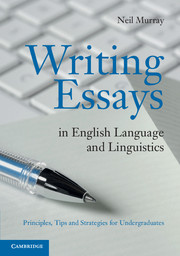 Writing Essays in English Language and Linguistics
Writing Essays in English Language and Linguistics Book contents
- Frontmatter
- Contents
- Acknowledgements
- Introduction
- A guide to the book's icons: what do they mean?
- Part 1 The basics
- Chapter 1 Writing at school and writing at university: are they really so different?
- Chapter 2 Fundamental principles
- Part 2 Getting down to writing
- Linguistics glossary
- Task key
- References
- Index
Chapter 1 - Writing at school and writing at university: are they really so different?
from Part 1 - The basics
Published online by Cambridge University Press: 05 June 2012
- Frontmatter
- Contents
- Acknowledgements
- Introduction
- A guide to the book's icons: what do they mean?
- Part 1 The basics
- Chapter 1 Writing at school and writing at university: are they really so different?
- Chapter 2 Fundamental principles
- Part 2 Getting down to writing
- Linguistics glossary
- Task key
- References
- Index
Summary
‘I just don't really know what to expect. What exactly are the differences between writing at school and writing at university?’
Introduction
Actually, despite the title of this section, the truth is that writing at school and writing at university are not really that different. Many of the adjustments you'll need to make to your writing will be adjustments of degree and style as much as anything else. The principles of good academic writing are the same whether you're writing as a high school student or as a postgraduate doctoral student.
‘So, why do I need a book of this kind?’ you're probably wondering. Well, here are a few reasons:
Due to such things as time pressure, a full curriculum and student capacity, schools vary in the attention they pay to developing academic writing skills.
Schools, understandably, tend to focus on training you to produce written work that will earn you good AS/A-level grades. They don't normally prepare you specifically for academic writing at undergraduate level. As a result, certain principles of writing are not covered at all or are covered only superficially, with much important detail often being left out – detail that may be crucial to successful assignment writing at university.
Traditional thinking has been that undergraduates will learn much of what they need to know ‘on the job’, once they enter university, through observation, a process of trial and error, and tutor feedback. Unfortunately, these days, the ever-increasing demands being placed on tutors' time means that it's becoming increasingly difficult for them to provide their students with detailed feedback on the form (as opposed to the content) of their writing, with the result that students themselves need to be more resourceful. Furthermore, many students who wish to make a good start with their first assignments feel anxious and uncomfortable about handing in essays without a clear grasp of what's expected of them. In other words, they're not happy to take the risk of ‘learning on the job’ as this may mean below-par marks in the early phase of their university careers.
While many academic departments, libraries or information services departments offer leaflets on aspects of academic writing such as referencing and plagiarism, these are often only very brief guides – useful certainly, but not really adequate.
Information
- Type
- Chapter
- Information
- Writing Essays in English Language and LinguisticsPrinciples, Tips and Strategies for Undergraduates, pp. 7 - 13Publisher: Cambridge University PressPrint publication year: 2012